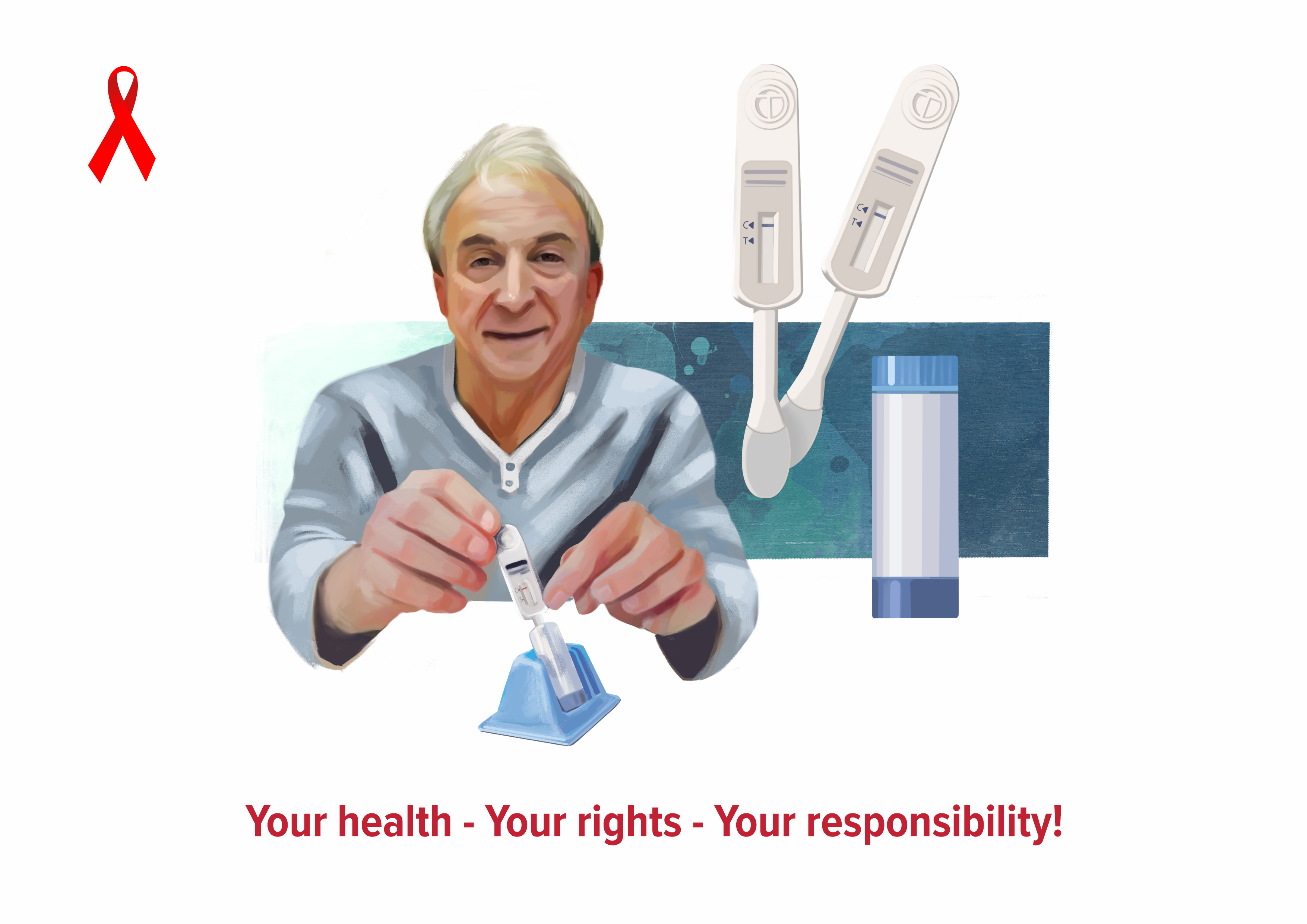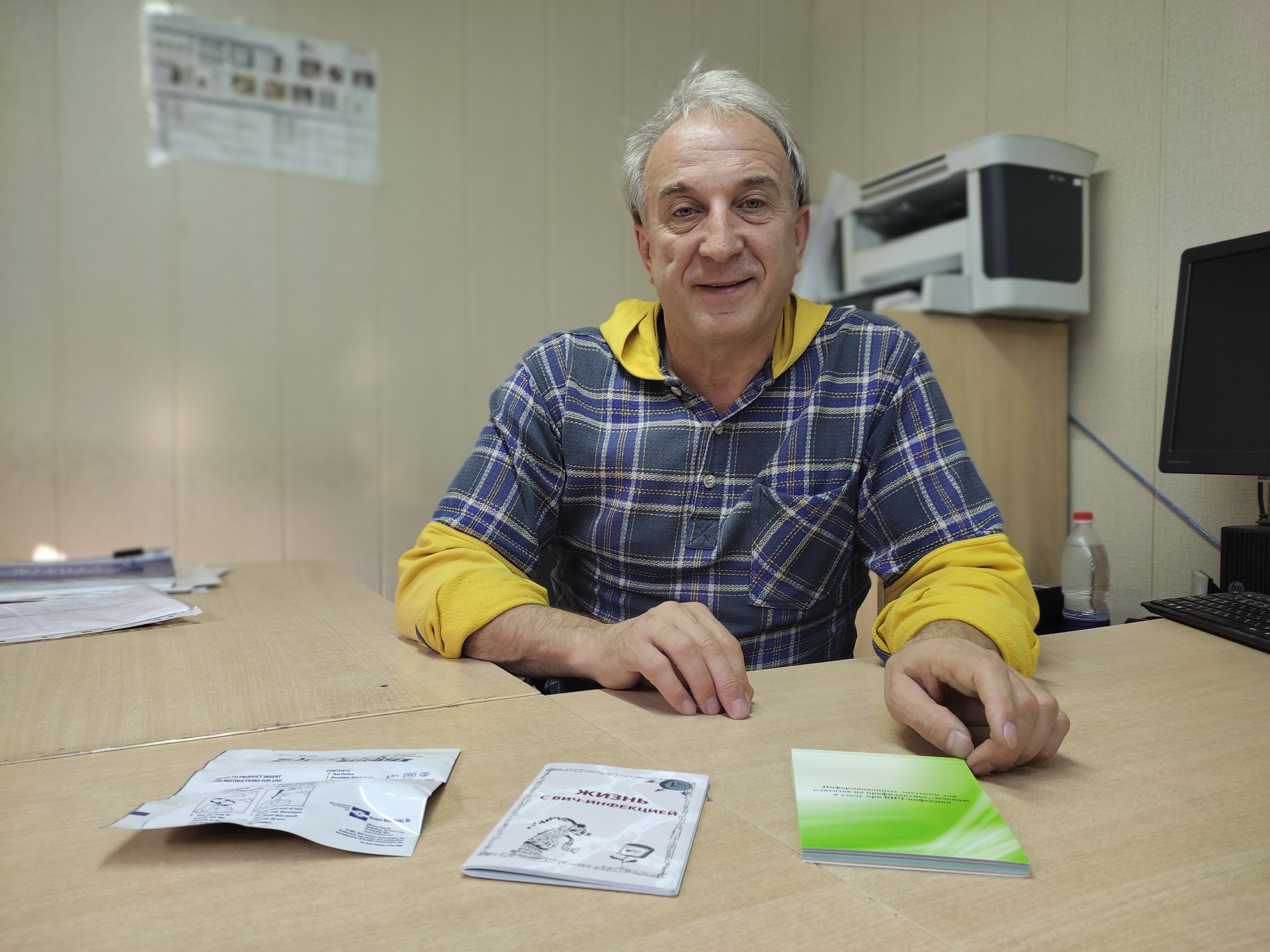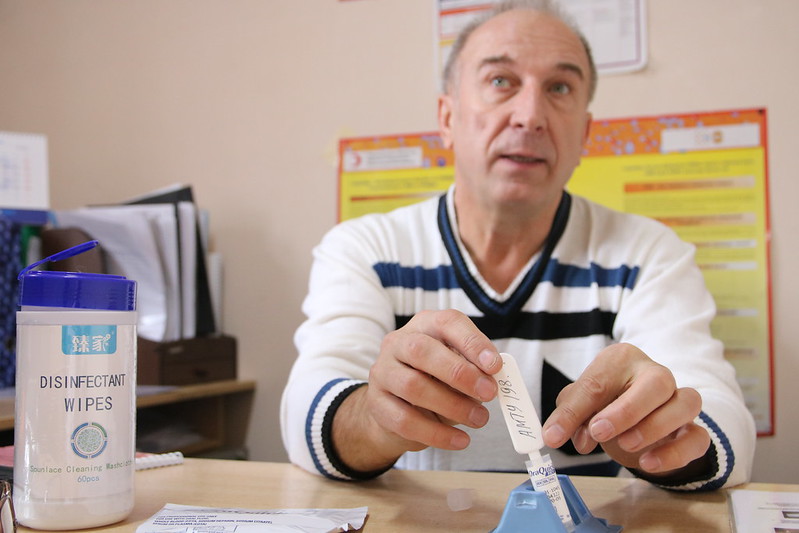62 year old Volodia has had such a fascinating life that he has even been the subject of a documentary movie. “It was called Going beyond the clouds. That year, I had decided to leave the disco club I had created, and instead go live in a monastery. In Kazakhstan, there’s a men’s monastery nested in the mountains. It was created in 1916 by two monks from the Issyk-Kul Region, who were persecuted and fled through the mountains. And we were walking to this monastery under heavy rain, haze, low-hanging clouds, in our robes. When we came out of the clouds, we could see the golden domes of the church. It was as if I was coming from that world into another one.”
Volodia really has travelled from one world to the next, from one country to another, but despite his life full of surprises, he’s always been dedicated to the fight against HIV.
26 years of activism
Volodia is among the first persons in Central Asia to have openly disclosed their sexual orientation and since, he’s been working to prevent HIV among his community. “In 1995, I was invited to the AIDS Center, and they asked me to gather a group. They told us about HIV, and we told them about our community. And I’ve been working in HIV programs since.”
At that time, being in a same-sex relationship was still punished by law, so when Volodia opened the very first organization for the prevention of HIV within the LGBT community in the region, he registered it as a “youth organization”. When the law was cancelled in 1998, Volodia started giving interviews.
Famous throughout the region, Volodia is the first to have opened a nightclub for the LGBT community. His local fame helped him reach out to a great number of people, and he used this opportunity to continue raising awareness on HIV. “At first, there were no prevention programs in Kyrgyzstan. We did everything on our own money, until 2004, when we started cooperating with the Global Fund. Many people went to our club and we used to organize lectures there and print brochures on HIV. We also went around schools and talked about HIV to students; back then there were few people who knew about HIV and it was crucial to raise awareness.”
Volodia himself has always been aware of HIV and careful in his behavior and, even though he has not contracted HIV, he’s decided to dedicate his life to HIV prevention and care programs, since he knows just how important of a problem HIV is in his community.
Volodia now works as a senior outreach worker for the AntiAIDS Association, in partnership with the national Global Fund project. His job is to regularly test clients for HIV, inform and consult them on HIV and help them accept their status if their test comes out positive. He also oversees the activities of his colleagues who work in the field and, as a “veteran” of the HIV fight, coaches them to be more effective.
Stigma, a barrier to HIV control programs
Volodia talks about the importance of outreach and creating a safe environment for people at risk of HIV infection, where people are treated with respect and their rights are protected:
“It’s important to have community-based service NGOs working in HIV programs, because our community, like many others, is closed. It is very difficult for the government to get in touch with our groups. Without these NGOs we cannot do prevention work and reach the groups which are most vulnerable to HIV infection. A gay person won’t go to the hospital for help, and they definitely won’t tell their doctor about their partners. But here, we can gather people, discuss, inform them, test them, and get them on treatment if needed. And we can find out about partners who might have been infected and invite them for free and anonymous HIV test. We don’t judge people here, and there’s nothing to be afraid of,” explains Volodia.
Volodia says he has always been lucky and has never encountered discrimination in his personal life. But the stories he has heard from friends and clients show that stigma and discrimination against people with a different sexual orientation, and against people living with HIV, remain a significant barrier to the effectiveness of HIV control programs and considerably complicate their lives. Many people in the LGBT community fall victim to beatings, exclusion and rights violations, and as a result, face isolation and depression.
Volodia tells a chilling story of such violence:“I had an acquaintance whose relatives knew that he was gay. One day, there was a conflict with his brothers. They told him that he was a shame to their entire family. They forced him into the car, brought him to his father’s grave in the middle of the night, and cut his throat from ear to ear. Then they stoned him and left him there to die. It’s a good thing that he still had his phone on him; he called me in the morning and asked me to pick him up. When I arrived, someone had already brought him to the local mosque and called the ambulance. I hid him at my place for a few weeks after he left the hospital.”
“If you’re independent, you won’t have any problems because of your status. But here, families are very tight, so for some people revealing that you are gay, or that you have HIV, can be extremely difficult and even dangerous,” says Volodia. “It’s especially hard in the south of the country. There, many men have a family even though they are gay, and they have to lead a secret double life. Families there place them in hospitals, beat them, and force them to marry. But what’s the use? They cannot change anyway. It’s better to accept and support your relative the way they are, than to push them into depression.”
Health and responsibility
This year, the national slogan for World AIDS Day is “your health – your rights – your responsibility”. This is also what Volodia tries to explain to each of his clients. “Nobody should have to run after you to get you tested or to go on treatment. Many people have become indifferent. They’re not worried, so it’s become harder to gather groups of people in the office. People have understood that you can take antiretroviral therapy and that HIV isn’t as scary as we thought. But you shouldn’t forget that HIV is for life, and that, without treatment, you can infect your loved ones too. People should come themselves to get tested, for their own safety, and for that of their families and partners, too.”
At 62 years old, Volodia has a lifetime of experience behind him and he hopes that, one day, the world will be able to eliminate HIV.

 Locations
Locations







